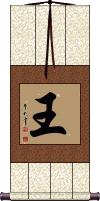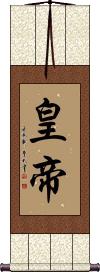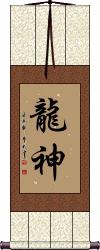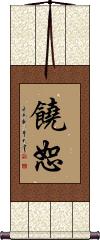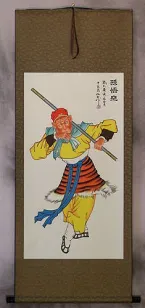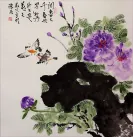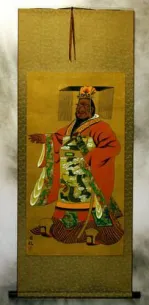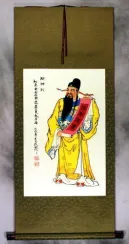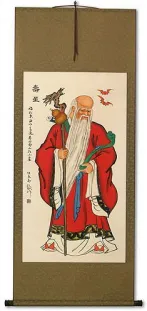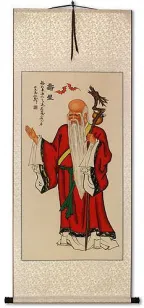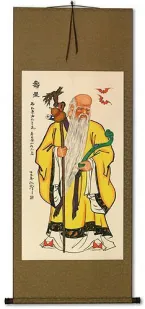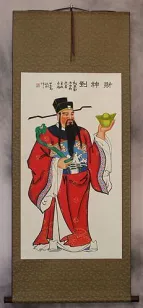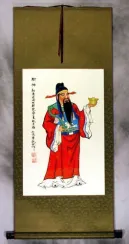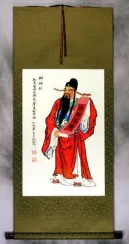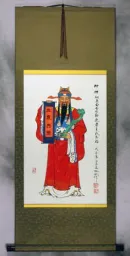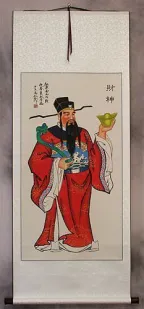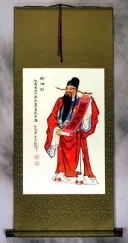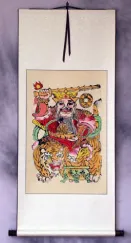Many custom options...
And formats...

God is King in Chinese / Japanese...
Buy a God is King calligraphy wall scroll here!
Personalize your custom “God is King” project by clicking the button next to your favorite “God is King” title below...
King
王 is wang which means king. It is not pronounced the way you think in Chinese. It is more like English speakers would want to pronounce wong. It has roughly the same vowel sound as tong, song, or long in English.
Note that this means king only, not the emperor. An emperor is higher than a king, and theoretically is chosen by God, according to ancient Chinese culture. However, the definition is often blurred at various points in Asian history.
王 can also be defined as ruler, sovereign, monarch, or magnate. It is also can refer to a game piece in the chess-like Japanese strategic game of shoji.
Note: This can also be a family name in Chinese, Korean and Vietnamese (in Vietnamese it's Vương).
See Also: Queen
Emperor
皇帝 means emperor in Chinese, Japanese, and old Korean.
From times of old, the emperors of Asia ruled under the authority of God himself. One definition of an emperor is a ruler put in power by God. This definition separates emperors from the various kings in Chinese history (although defining who is a king versus an emperor gets vague sometimes).
Occasionally, the emperor's wife was widowed, and she took the role of an empress until her death (see our entry for empress if that is what you are looking for).
Dragon Spirit
龍神 is a Chinese, Japanese Kanji, and old Korean Hanja title that can mean “dragon god,” “dragon king,” or “dragon spirit.”
In the context of Buddhism, this is one of eight kinds of spiritual beings found in Mahāyāna texts.
Begging Forgiveness
John 3:16
神愛世人甚至將他的獨生子賜給他們叫一切信他的不至滅亡反得永生 is the full translation of John 3:16 into Chinese.
This is from the Chinese Union Bible which comes from a revised version of the King James. This Chinese Bible was originally translated and printed in 1919 (several revisions since then).
Because of the origin being the KJV, I'll say that in English, this would be, “For God so loved the world, that he gave his only begotten Son, that whosoever believeth in him should not perish but have everlasting life.”
As with any translation, there are interesting cultural and linguistic issues. For instance, the word used for “world” in Chinese can also mean “common people.” So you could say that it means “For God so loved the common people...”
This does not take away from the text, as it will be understood with the same meaning and connotation.
There is no direct Greek-to-Chinese translation in print (that I know of), so this is the best available. Of course, you can ask any Greek person of faith, and they will claim that a bit is lost from the original Greek of the New Testament to any of the English versions of the Bible in print.
I've noticed you are searching for "god is king". If you are interested, I can have your favorite verse from the Torah or Bible translated into Chinese and written on a wall scroll for you. Please contact me siting the verse or verses you want. Here is an example: Joshua 24:15.
If you are looking for a Jewish or Christian title, phrase, or word, I have a great selection here: Christian Words in Chinese
This in-stock artwork might be what you are looking for, and ships right away...
Gallery Price: $200.00
Your Price: $79.88
Gallery Price: $286.00
Your Price: $158.88
Gallery Price: $108.00
Your Price: $59.88
Not the results for god is king that you were looking for?
Below are some entries from our dictionary that may match your god is king search...
| Characters If shown, 2nd row is Simp. Chinese |
Pronunciation Romanization |
Simple Dictionary Definition |
龍神 龙神 see styles |
lóng shén long2 shen2 lung shen ryuujin / ryujin りゅうじん |
More info & calligraphy: Dragon SpiritA dragon-god, or spirit. |
龗 see styles |
líng ling2 ling okami おかみ |
dragon (rare) water god; rain and snow god; dragon god; dragon king |
冥王 see styles |
míng wáng ming2 wang2 ming wang meiou / meo めいおう |
the king of hell (1) {grmyth} (See ハデス・1) Hades (god); (2) {rommyth} (See プルートー・1) Pluto (god); (surname) Meiou |
周公 see styles |
zhōu gōng zhou1 gong1 chou kung shuukou / shuko しゅうこう |
Duke of Zhou (11th c. BC), son of King Wen of Zhou 周文王[Zhou1 Wen2 wang2], played an important role as regent in founding the Western Zhou 西周[Xi1 Zhou1], and is also known as the "God of Dreams" (personal name) Shuukou |
天帝 see styles |
tiān dì tian1 di4 t`ien ti tien ti tentei / tente てんてい |
God of heaven; Celestial emperor (1) Shangdi (supreme deity in ancient Chinese religion); (2) {Christn} God; (3) {Buddh} (See 帝釈天・たいしゃくてん) Shakra (king of heaven in Hindu mythology); Indra King, or emperor of Heaven, i. e. 因陀羅 Indra, i. e. 釋 (釋迦); 釋迦婆; 帝 (帝釋); Śakra, king of the devaloka 忉利天, one of the ancient gods of India, the god of the sky who fights the demons with his vajra, or thunderbolt. He is inferior to the trimūrti, Brahma, Viṣṇu, and Śiva, having taken the place of Varuṇa, or sky. Buddhism adopted him as its defender, though, like all the gods, he is considered inferior to a Buddha or any who have attained bodhi. His wife is Indrāṇī. |
天王 see styles |
tiān wáng tian1 wang2 t`ien wang tien wang tennou / tenno てんのう |
emperor; god; Hong Xiuquan's self-proclaimed title; see also 洪秀全[Hong2 Xiu4 quan2] (1) {Buddh} heavenly king; (2) (See 牛頭天王) Gozu Tenno (deity said to be the Indian god Gavagriva); (place-name, surname) Tennou Maharāja-devas; 四天王 Caturmahārāja. The four deva kings in the first or lowest devaloka, on its four sides. E. 持國天王 Dhṛtarāṣṭra. S. 增長天王 Virūḍhaka. W. 廣目天王 Virūpākṣa. N. 多聞天王 Dhanada, or Vaiśravaṇa. The four are said to have appeared to 不空 Amogha in a temple in Xianfu, some time between 742-6, and in consequence he introduced their worship to China as guardians of the monasteries, where their images are seen in the hall at the entrance, which is sometimes called the 天王堂 hall of the deva-kings. 天王 is also a designation of Siva the 大白在, i. e. Maheśvara 摩醯首羅, the great sovereign ruler. |
文殊 see styles |
wén shū wen2 shu1 wen shu monju もんじゅ |
Manjushri, the Bodhisattva of keen awareness (Buddhist term) Manjushri; Manjusri; Bodhisattva that represents transcendent wisdom; (p,s,f) Monju (文殊師利) Mañjuśrī 滿殊尸利 -later 曼殊室利. 文殊 is also used for Mañjunātha, Mañjudeva, Mañjughoṣa, Mañjuṣvara, et al. T., hjamdpal; J., Monju. Origin unknown; presumably, like most Buddhas and bodhisattvas, an idealization of a particular quality, in his case of Wisdom. Mañju is beautiful, Śrī; good fortune, virtue, majesty, lord, an epithet of a god. Six definitions are obtained from various scriptures: 妙首 (or 頭 ) wonderful or beautiful) head; 普首 universal head; 濡首 glossy head (probably a transliteration); 敬首 revered head; 妙德 wonderful virtue (or power); 妙吉祥 wonderfully auspicious; the last is a later translation in the 西域記. As guardian of wisdom 智慧 he is often placed on Śākyamuni's left, with 普顯 on the right as guardian of law 理, the latter holding the Law, the former the wisdom or exposition of it; formerly they held the reverse positions. He is often represented with five curls or waves to his hair indicating the 五智 q. v. or the five peaks; his hand holds the sword of wisdom and he sits on a lion emblematic of its stern majesty: but he has other forms. He is represented as a youth, i. e. eternal youth. His present abode is given as east of the universe, known as 淸涼山 clear and cool mountain, or a region 寶住 precious abode, or Abode of Treasures, or 寶氏 from which he derives one of his titles, 寶相如來. One of his dhāraṇīs prophesies China as his post-nirvāṇa realm. In past incarnations he is described as being the parent of many Buddhas and as having assisted the Buddha into existence; his title was 龍種上佛 the supreme Buddha of the nāgas, also 大身佛 or 神仙佛; now his title is 歡喜藏摩尼寶精佛 The spiritual Buddha who joyfully cares for the jewel: and his future title is to be 普現佛 Buddha universally revealed. In the 序品 Introductory Chapter of the Lotus Sutra he is also described as the ninth predecessor or Buddha-ancestor of Śākyamuni. He is looked on as the chief of the Bodhisattvas and represents them, as the chief disciple of the Buddha, or as his son 法王子. Hīnayāna counts Śāriputra as the wisest of the disciples, Mahāyāna gives Mañjuśrī the chief place, hence he is also styled 覺母 mother, or begetter of understanding. He is shown riding on either a lion or a peacock, or sitting on a white lotus; often he holds a book, emblem of wisdom, or a blue lotus; in certain rooms of a monastery he is shown as a monk; and he appears in military array as defender of the faith. His signs, magic words, and so on, are found in various sutras. His most famous centre in China is Wu-tai shan in Shansi. where he is the object of pilgrimages, especially of Mongols. The legends about him are many. He takes the place in Buddhism of Viśvakarman as Vulcan, or architect, of the universe. He is one of the eight Dhyāni-bodhisattvas, and sometimes has the image of Akṣobhya in his crown. He was mentioned in China as early as the fourth century and in the Lotus Sutra he frequently appears, especially as the converter of the daughter of the Dragon-king of the Ocean. He has five messengers 五使者 and eight youths 八童子 attending on him. His hall in the Garbhadhātu maṇḍala is the seventh, in which his group numbers twenty-five. His position is northeast. There are numerous sutras and other works with his name as title, e. g. 文殊師利問菩提經 Gayaśīrṣa sūtra, tr. by Kumārajīva 384-417: and its 論 or .Tīkā of Vasubandhu, tr. by Bodhiruci 535. see list in B. N. |
水天 see styles |
shuǐ tiān shui3 tian1 shui t`ien shui tien suiten すいてん |
(1) water and sky; (2) Varuna; Vedic god of water and sky (adopted into Buddhism as god of water and protector of the west) Varuṇa, 縛嚕拏; 婆樓那 ούϕανός, the heavens, or the sky, where are clouds and dragons; the 水神 water-deva, or dragon-king, who rules the clouds, rains, and water generally. One of the 大神 in the esoteric maṇḍalas; he rules the west; his consort is the 水天妃 represented on his left, and his chief retainer 水天眷屬 is placed on his right. |
神王 see styles |
shinou / shino しんおう |
(1) god king; god-king; (2) {Buddh} guardian deity; (surname) Shin'ou |
神農 神农 see styles |
shén nóng shen2 nong2 shen nung jinnou / jinno じんのう |
Shennong or Farmer God (c. 2000 BC), first of the legendary Flame Emperors, 炎帝[Yan2 di4] and creator of agriculture Shennong; mythical king of ancient China; (surname) Jinnou |
竜神 see styles |
ryuujin / ryujin りゅうじん |
(1) dragon god; dragon king; (2) (Buddhist term) naga; (place-name, surname) Ryūjin |
聖神 圣神 see styles |
shèng shén sheng4 shen2 sheng shen maria まりあ |
feudal term of praise for ruler, king or emperor; general term for saint in former times; term for God during the Taiping Heavenly Kingdom 太平天國|太平天国; Holy Spirit (in Christian Trinity) (female given name) Maria |
閻魔 阎魔 see styles |
yán mó yan2 mo2 yen mo enma えんま |
(Buddhism) Yama, the King of Hell {Buddh} Yama (King of Hell who judges the dead); Enma; (dei) Yama (King of Hell who judges the dead); Enma 閻王 閻羅; (閻魔王); 閻摩羅; 閻老 Yama, also v. 夜; 閻羅王 Yama. (1) In the Vedas the god of the dead, with whom the spirits of the departed dwell. He was son of the Sun and had a twin sister Yamī or Yamuna. By some they were looked upon as the first human pair. (2) In later Brahmanic mythology, one of the eight Lokapālas, guardian of the South and ruler of the Yamadevaloka and judge of the dead. (3) In Buddhist mythology, the regent of the Nārakas, residing south of Jambudvīpa, outside of the Cakravālas, in a palace of copper and iron. Originally he is described as a king of Vaiśālī, who, when engaged in a bloody war, wished he were master of hell, and was accordingly reborn as Yama in hell together with his eighteen generals and his army of 80,000 men, who now serve him in purgatory. His sister Yamī deals with female culprits. Three times in every twenty-four hours demon pours into Yama's mouth boiling copper (by way of punishment), his subordinates receiving the same dose at the same time, until their sins are expiated, when he will be reborn as Samantarāja 普王. In China he rules the fifth court of purgatory. In some sources he is spoken of as ruling the eighteen judges of purgatory. |
おかみ see styles |
okami おかみ |
(obscure) water god; rain and snow god; dragon god; dragon king |
倶毘羅 倶毘罗 see styles |
jù pí luó ju4 pi2 luo2 chü p`i lo chü pi lo kubira |
(1) kumbhīra, crocodile; also鳩鞞羅; 倶尾羅. (2) Kuvera, Kubera, the guardian king of the north, v. 毘沙門 Vaiśravaṇa, the god of wealth. |
梵天王 see styles |
fàn tiān wáng fan4 tian1 wang2 fan t`ien wang fan tien wang bontenou; bontennou / bonteno; bontenno ぼんてんおう; ぼんてんのう |
(rare) (See 梵天・1) Brahma (Hindu creator god) Brahmā v. above, and cf. 梵王. 梵天界 His realm. |
毘沙門 毘沙门 see styles |
pí shā mén pi2 sha1 men2 p`i sha men pi sha men bishamon びしゃもん |
(place-name) Bishamon (毘沙門天王) Vaiśravaṇa. Cf. 財 and 倶. One of the four mahārājas, guardian of the North, king of the yakṣas. Has the title 多聞; 普聞; universal or much hearing or learning, said to be so called because he heard the Buddha's preaching; but Vaiśravaṇa was son of Viśravas, which is from viśru, to be heard of far and wide, celebrated, and should be understood in this sense. Vaiśravaṇa is Kuvera, or Kubera, the Indian Pluto; originally a chief of evil spirits, afterwards the god of riches, and ruler of the northern quarter. Xuanzong built a temple to him in A. D. 753, since which he has been the god of wealth in China, and guardian at the entrance of Buddhist temples. In his right hand he often holds a banner or a lance, in his left a pearl or shrine, or a mongoose out of whose mouth jewels are pouring; under his feet are two demons. Colour, yellow. |
托塔天王 see styles |
tuō tǎ tiān wáng tuo1 ta3 tian1 wang2 t`o t`a t`ien wang to ta tien wang Takutō tennō |
the pagoda bearing god The deva-king who bears a pagoda on his palm, one of the four mahārājas, i. e. 毘沙門 Vaiśravaṇa. |
金剛力士 金刚力士 see styles |
jīn gāng lì shì jin1 gang1 li4 shi4 chin kang li shih kongourikishi / kongorikishi こんごうりきし |
{Buddh} (See 金剛杵・こんごうしょ) Deva king (guardian god at a temple gate, holding a vajra); Vajrapani vajra-warriors |
Variations: |
ryuujin / ryujin りゅうじん |
(1) dragon god; dragon king; (2) {Buddh} naga |
最上祕密那拏天經 最上祕密那拏天经 see styles |
zuì shàng mì mì nǎn á tiān jīng zui4 shang4 mi4 mi4 nan3 a2 tian1 jing1 tsui shang mi mi nan a t`ien ching tsui shang mi mi nan a tien ching Saijō himitsu nadaten gyō |
King of Ritual Procedures for the God Naḍa |
Variations: |
kamisama かみさま |
(1) (honorific or respectful language) God; god; deity; divinity; spirit; kami; (2) ace; king; superior person; god (amongst men) |
The following table may be helpful for those studying Chinese or Japanese...
| Title | Characters | Romaji (Romanized Japanese) | Various forms of Romanized Chinese | |
| King | 王 | ou / o | wáng / wang2 / wang | |
| Emperor | 皇帝 | koutei / kotei | huáng dì / huang2 di4 / huang di / huangdi | huang ti / huangti |
| Dragon Spirit | 龍神 龙神 | ryuu jin / ryuujin / ryu jin | lóng shén long2 shen2 long shen longshen | lung shen lungshen |
| Begging Forgiveness | 饒恕 饶恕 | ráo shù / rao2 shu4 / rao shu / raoshu | jao shu / jaoshu | |
| John 3:16 | 神愛世人甚至將他的獨生子賜給他們叫一切信他的不至滅亡反得永生 神爱世人甚至将他的独生子赐给他们叫一切信他的不至灭亡反得永生 | shén ài shì rén shèn zhì jiāng tā de dú shēng zǐ cì gè tā mén jiào yí qiè xìn tā de bú zhì miè wáng fǎn dé yǒng shēng shen2 ai4 shi4 ren2 shen4 zhi4 jiang1 ta1 de du2 sheng1 zi3 ci4 gei3 ta1 men2 jiao4 yi2 qie4 xin4 ta1 de bu2 zhi4 mie4 wang2 fan3 de2 yong3 sheng1 shen ai shi ren shen zhi jiang ta de du sheng zi ci gei ta men jiao yi qie xin ta de bu zhi mie wang fan de yong sheng | shen ai shih jen shen chih chiang t`a te tu sheng tzu tz`u kei t`a men chiao i ch`ieh hsin t`a te pu chih mieh wang fan te yung sheng shen ai shih jen shen chih chiang ta te tu sheng tzu tzu kei ta men chiao i chieh hsin ta te pu chih mieh wang fan te yung sheng |
|
| In some entries above you will see that characters have different versions above and below a line. In these cases, the characters above the line are Traditional Chinese, while the ones below are Simplified Chinese. | ||||
Successful Chinese Character and Japanese Kanji calligraphy searches within the last few hours...
